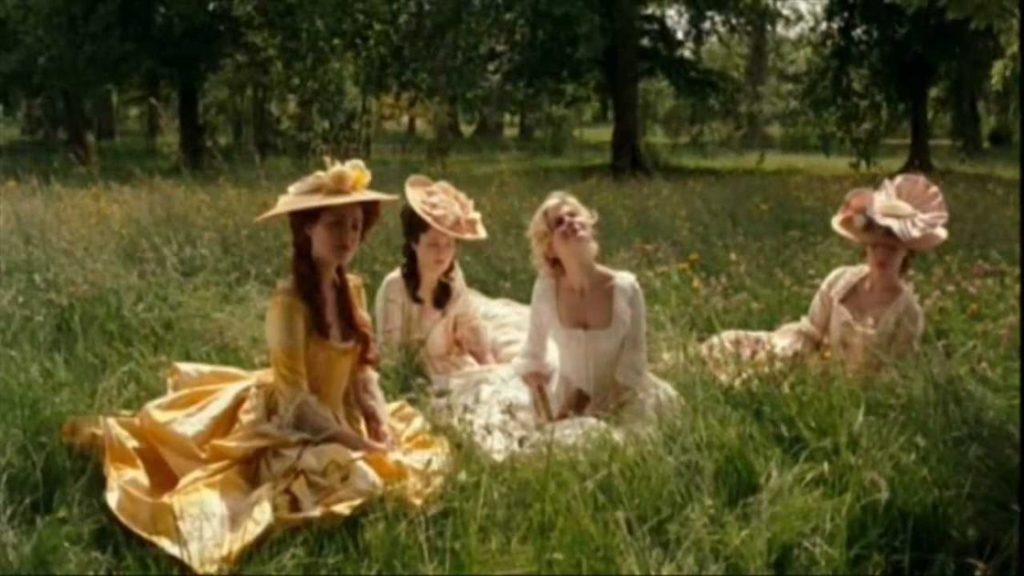
Burgers and Lobsters, and the Petit Trianon
Marie-Antoinette had an interesting way of unwinding at the Petit Trianon, the small Palace that was her escape from the ‘pressures’ of Queenship up at the ‘big house’ in Versaille. In the grounds of the Petit Trianon, she ordered the construction of a hameau, a mock French farming village, complete with rabbits, pigs, cows and some fields of wheat and barley which she oversaw. A.U Wertmüller, some-time a resident artist at Versaille depicts, in one of his portraits from the French court, one of Marie-Antoinette’s confidants, Adelaide Auguie, dressed in a mock peasant milk maid’s dress in the Queens Laiterie. Apocryphal or not, the story runs that the Queen herself had elaborate shepherdess and farm-girl costumes made by her royal dressmakers, in which she would play at the peasant-girl, tending to her sheep or milking her cows until, bored, she would retire to the Trianon, most likely for cake.
Why I bother to relay this story is because the same disdain I have for this playing at the peasant is how I am beginning to feel about the current trend for single-dish and short menu restaurants in London. What once started as a desire for simplicity, great ingredients and an unfussy return to ‘real’ food has become a caricature of itself, what the hameau was to a working rural village. Just as the immediate post-recessionary automotive craze for matte-black coating Porsches, BMWs and Range Rover Vogues as well as other high end vehicle, ( low profile, low sheen and therefore permissible luxury ran the simplistic hedge-funder logic) these restaurants the Tramsheds, Bubble Dogs and Burger & Lobsters of the world are now seen as a permissible display of status by way of discernment in this post-recessionary realignment, the after-Lehman L’Atelier Joel Robuchon. Except, the problem is that once they become a covert status game, the food suffers. Once the thing is that it is ‘a thing’ then the food is no longer the thing. The shred of dignity provided by their stripped back approach is becoming stretched to the point of absurdity, with a restaurant specialising in only champagne and hotdog or only burgers and lobsters bearing little resemblance to the honest culinary ethos that may have been the one iota of authentic grit in the oyster when this whole charade began. This rule can be almost uiversally applied to anything with ‘streetfood’ in its subhead.
The ersatz nature of the whole stripped back food vibe becomes apparent when you eat at some of these restaurants- catering to a certain comfortable chattering class background that wants to play at the peasant girl. Meat Liquor’s burgers are over-hyped, over-greasy and made from poor cuts. They remind me of the kind of burger that I would get for a pound from a burger van at the funfairs of my childhood. Yet for those who venerate these establishments, these vans were were verboten, so now in urban 20- and 30- something-hood their sustenance, or a repackaged version of it, becomes fetishised, an exciting sense of what is forbidden, an element of transgression to add to dimensionalise this status.
If you want a burger van burger, go to a windy car-park by a builders merchant in Mitcham. If you want to open one of these restaurant, make the narrative about the food rather than pretending its about the food when actually its about the catchiest menu combination or newest streetfood novelty.
Amongst the shining skyscrapers of Dubai, a city that doesn’t do ersatz modesty, culinarily or otherwise, I visited a place in porta-cabin, the Bu Qtair restaurant with no menu and whose clientele consisted of a pretty even split of expatriates, from both East and West, and South Asian migrant workers. Plastic tables and chairs were strewn outside and there was no menu, just large plastic tubs of masala-seasoned fish bought each morning from the boats ( Dubai actiually has a working fishing fleet… ), fried to order and served out of a side window of the cabin. No show, no fuss, no ‘concept’ other than serving incredible spicy fish and chapatis to anyone who wanted to eat. Happiness should be good food, not a culinary mock-hamlet.